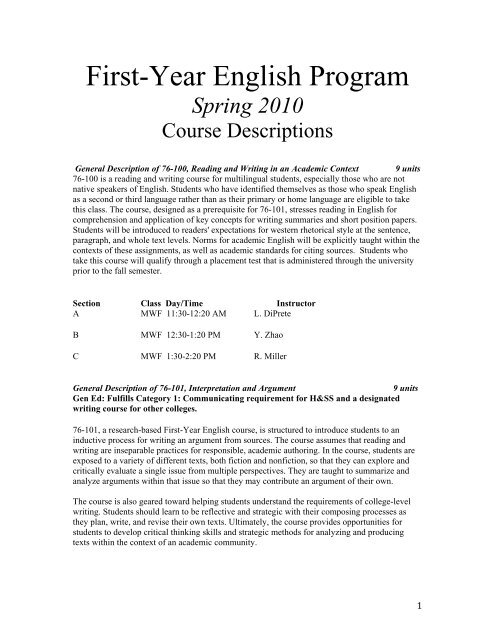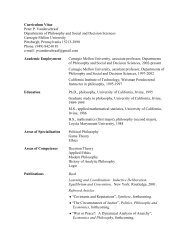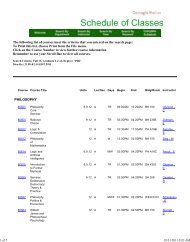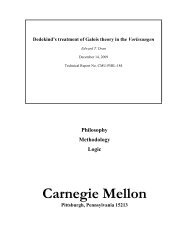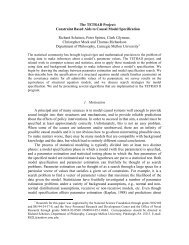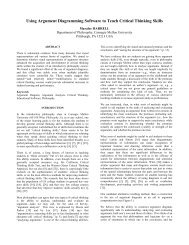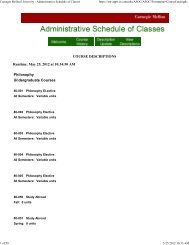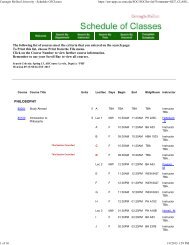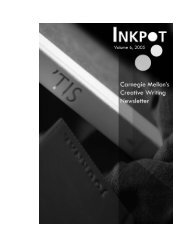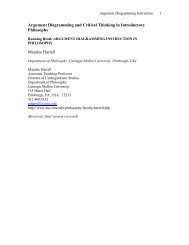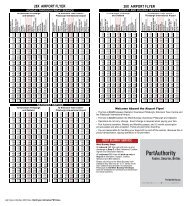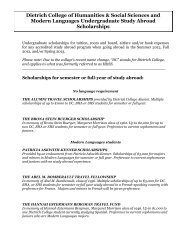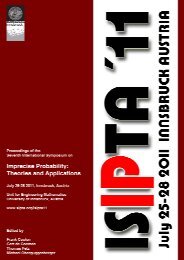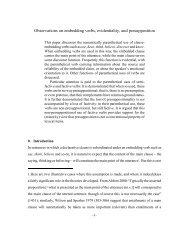First-Year English Program - College of Humanities and Social ...
First-Year English Program - College of Humanities and Social ...
First-Year English Program - College of Humanities and Social ...
Create successful ePaper yourself
Turn your PDF publications into a flip-book with our unique Google optimized e-Paper software.
<strong>First</strong>-<strong>Year</strong> <strong>English</strong> <strong>Program</strong><br />
Spring 2010<br />
Course Descriptions<br />
General Description <strong>of</strong> 76-100, Reading <strong>and</strong> Writing in an Academic Context 9 units<br />
76-100 is a reading <strong>and</strong> writing course for multilingual students, especially those who are not<br />
native speakers <strong>of</strong> <strong>English</strong>. Students who have identified themselves as those who speak <strong>English</strong><br />
as a second or third language rather than as their primary or home language are eligible to take<br />
this class. The course, designed as a prerequisite for 76-101, stresses reading in <strong>English</strong> for<br />
comprehension <strong>and</strong> application <strong>of</strong> key concepts for writing summaries <strong>and</strong> short position papers.<br />
Students will be introduced to readers' expectations for western rhetorical style at the sentence,<br />
paragraph, <strong>and</strong> whole text levels. Norms for academic <strong>English</strong> will be explicitly taught within the<br />
contexts <strong>of</strong> these assignments, as well as academic st<strong>and</strong>ards for citing sources. Students who<br />
take this course will qualify through a placement test that is administered through the university<br />
prior to the fall semester.<br />
Section Class Day/Time Instructor<br />
A MWF 11:30-12:20 AM L. DiPrete<br />
B MWF 12:30-1:20 PM Y. Zhao<br />
C MWF 1:30-2:20 PM R. Miller<br />
General Description <strong>of</strong> 76-101, Interpretation <strong>and</strong> Argument<br />
9 units<br />
Gen Ed: Fulfills Category 1: Communicating requirement for H&SS <strong>and</strong> a designated<br />
writing course for other colleges.<br />
76-101, a research-based <strong>First</strong>-<strong>Year</strong> <strong>English</strong> course, is structured to introduce students to an<br />
inductive process for writing an argument from sources. The course assumes that reading <strong>and</strong><br />
writing are inseparable practices for responsible, academic authoring. In the course, students are<br />
exposed to a variety <strong>of</strong> different texts, both fiction <strong>and</strong> nonfiction, so that they can explore <strong>and</strong><br />
critically evaluate a single issue from multiple perspectives. They are taught to summarize <strong>and</strong><br />
analyze arguments within that issue so that they may contribute an argument <strong>of</strong> their own.<br />
The course is also geared toward helping students underst<strong>and</strong> the requirements <strong>of</strong> college-level<br />
writing. Students should learn to be reflective <strong>and</strong> strategic with their composing processes as<br />
they plan, write, <strong>and</strong> revise their own texts. Ultimately, the course provides opportunities for<br />
students to develop critical thinking skills <strong>and</strong> strategic methods for analyzing <strong>and</strong> producing<br />
texts within the context <strong>of</strong> an academic community.<br />
1
Section A<br />
V. Perry<br />
8:30-9:20 AM<br />
Before And After The Crash: Public Argument <strong>and</strong> The US Economy<br />
What should American economic policy be? What role should the public play in economic<br />
decision-making? In normal times we have been content to leave these questions to experts or<br />
trust the “free market” to look after itself. The crash <strong>of</strong> 2008 painfully brought these questions<br />
back to center stage. In this section <strong>of</strong> 76-101 we will examine public arguments about the<br />
economy through a variety <strong>of</strong> media. We will learn just enough economics to underst<strong>and</strong> how it<br />
all can go right or wrong, <strong>and</strong> examine influential arguments that help set the scene. Then we<br />
will try to make sense <strong>of</strong> the <strong>of</strong>ten angry public debate over economic policy in the wake <strong>of</strong> the<br />
crash, the bailouts, <strong>and</strong> the stimulus packages. While considering these issues students will learn<br />
important academic reading <strong>and</strong> writing skills, including the close analysis <strong>of</strong> argument structure<br />
<strong>and</strong> the synthesis <strong>of</strong> argumentative positions from a variety <strong>of</strong> sources. By the end <strong>of</strong> the term<br />
students will write their own informed contribution to the continuing conversation about the<br />
American economy that we will engage within this course.<br />
Section B<br />
L. Schmidt<br />
9:30-10:20 AM<br />
The Sokal Affair: the practice <strong>of</strong> science, the humanities, <strong>and</strong> academic life in the public<br />
sphere<br />
The now decade-old submission <strong>of</strong> Alan Sokal, a physicist at NYU, to the cultural studies journal<br />
<strong>Social</strong> Text set <strong>of</strong>f a furor <strong>of</strong> press <strong>and</strong> academic activity when he revealed in Lingua Franca that<br />
his submission was a ‘hoax.’ He claimed the submission showed the dangerous downward spiral<br />
<strong>of</strong> humanities’ reliance on a postmodern ideology that denies the objective nature <strong>of</strong> reality <strong>and</strong><br />
the status <strong>of</strong> scientific truth. This class will investigate the original submission <strong>and</strong> responses to it,<br />
from press-based reports to physicists <strong>and</strong> literary theorists’ responses on the pages <strong>of</strong> academic<br />
journals themselves, in order to examine the debates around this incident. We will consider these<br />
debates <strong>and</strong> their importance to the practice <strong>of</strong> science, the humanities, <strong>and</strong> academic life in the<br />
public sphere. Students in this class will work to engage with this material in order to begin to<br />
learn the conventions <strong>and</strong> challenges <strong>of</strong> academic controversies <strong>and</strong> contributions, especially as<br />
they move toward writing their own argument analyses, syntheses, <strong>and</strong> contributions.<br />
Section C<br />
D. Phillips<br />
9:30-10:20 AM<br />
Media <strong>and</strong> Public Debate<br />
Public debate is necessary to promote an engaged, democratic society, <strong>and</strong> the media system is<br />
the primary means by which information is disseminated to the masses. Yet questions arise as to<br />
what it means to be engaged <strong>and</strong> which form(s) <strong>of</strong> media best serve this purpose. Complicating<br />
the debate is the emergence <strong>of</strong> new technologies that is threatening the role <strong>of</strong> traditional<br />
journalism in the United States. Do these new media outlets serve to bring the U.S. toward a<br />
more unified public sphere or do they, in fact, fragment our society into competing public spheres<br />
that actually undermine the unified democratic process?<br />
In this course we will seek to underst<strong>and</strong> the role <strong>of</strong> media in a democratic society, as well as who<br />
is considered a journalist, <strong>and</strong> ultimately, what such a definition affords. Further, we will unpack<br />
the nature <strong>of</strong> public debate <strong>and</strong> its ability to support democracy. At the end <strong>of</strong> the semester, you<br />
should be able to situate your opinions within the context <strong>of</strong> the larger debate. You will be asked<br />
to summarize <strong>and</strong> synthesize major approaches before <strong>of</strong>fering your own original argument.<br />
2
Section D<br />
A. Karlin<br />
9:30-10:20 AM<br />
It’s All About ME! : Perspectives on Selves <strong>and</strong> Others<br />
You know who you are, right? If I were to ask you to indicate yourself, you’d probably be able to<br />
point to your own body, utter your name, or provide your CMU student ID. But, where <strong>and</strong> what<br />
exactly is the self? What makes you “you”?<br />
This 76-101 section is devoted to examining <strong>and</strong> debating the construction, function, <strong>and</strong><br />
existence <strong>of</strong> a boundary between "self" <strong>and</strong> "other." Despite our daily, intimate, life-long<br />
relationship with our “selves,” can we really say we know who we are? From the Sanskrit atman<br />
to the Greek psyche, from existentialist analyses to developmental psychological views on<br />
consciousness, the “self” has drawn a great deal <strong>of</strong> attention. We will sift through the arguments<br />
<strong>of</strong> Western philosophers, scientists, <strong>and</strong> psychologists like Martin Buber, Carl Jung, Jean Paul<br />
Sartre, <strong>and</strong> Abraham Maslow, Eastern thinkers like Shantideva, Lao Tzu, <strong>and</strong> Patanjali, <strong>and</strong><br />
contemporary films such as Woody Allen’s Zelig (1983) <strong>and</strong> Peter Weir’s The Truman Show<br />
(1998). Based on these authors’ representations <strong>of</strong> “self”, we will first produce texts that analyze<br />
<strong>and</strong> synthesize their perspectives in relation to one another. We will then ultimately author our<br />
own academic contributions to debates on how definitions <strong>of</strong> “self” shape how we form<br />
relationships, <strong>and</strong> engage <strong>and</strong> empathize with others.<br />
Section L<br />
K. Shimmin<br />
9:30-10:20 AM<br />
The Politics <strong>of</strong> Genocide<br />
What do we do with genocide? In this 76-101 course, we will examine various definitions <strong>of</strong><br />
genocide <strong>and</strong> arguments about what are the points <strong>of</strong> tension that need to be resolved in order for<br />
the international community to intervene when genocide occurs. We will draw on the films The<br />
Armenian Genocide, The Killing Fields, <strong>and</strong> Beyond the Gates. We will also consider segments<br />
from Samantha Power’s Pulitzer Prize winning book, A Problem from Hell, to examine how the<br />
U.S. has treated the problem <strong>of</strong> genocide from the Armenian Genocide in World War I, to the socalled<br />
“ethnic cleansing” in Cambodia <strong>and</strong> Rw<strong>and</strong>a. We will consider arguments for isolation,<br />
others for intervention, <strong>and</strong> still others for suspicion <strong>and</strong> denial—especially within the ongoing<br />
situation in Darfur. As we discuss these perspectives, we will learn strategies for summarizing,<br />
synthesizing, <strong>and</strong> analyzing arguments within an ongoing academic debate. By the end <strong>of</strong> the<br />
course, students will write their own arguments about how we can underst<strong>and</strong> advocacy—or a<br />
lack <strong>of</strong> it—when people are confronted with the ugly reality <strong>of</strong> genocide.<br />
Section BB<br />
M. Colabuono<br />
10:30-11:20 AM<br />
Who are you? Who cares?<br />
We are confronted with the word identity on a day-to-day basis, but what exactly is identity, <strong>and</strong><br />
why does it matter? How does our identity affect our daily lives, our notions <strong>of</strong> who we are, <strong>and</strong><br />
how we exist within society? To what extent do we control the way our identity is represented in<br />
the world? Do we choose our identities? These are all questions we will explore in this section <strong>of</strong><br />
76-101. We will look at theories <strong>of</strong> identity in general, as well as the way specific identity groups<br />
3
exist <strong>and</strong> interact within today's society while we consider how various constructions <strong>of</strong> identity<br />
shape culture <strong>and</strong> in turn are shaped by cultural factors, such as biology, politics, <strong>and</strong> even<br />
technology. Not only will contemporary ideas <strong>of</strong> identity come into play, but also historical<br />
perspectives on identity will aid our exploration <strong>of</strong> this topic. Students will engage with the<br />
subject through class discussion as well as work on their writing skills through a number <strong>of</strong><br />
writing assignments that will lead them to become contributors to the existing discourse <strong>of</strong><br />
identity studies.<br />
Section E<br />
N. Datta<br />
10:30-11:20 AM<br />
Surviving Tourism: Stories We Would Really Like To Tell.<br />
Why do people feel the desire to travel to far-<strong>of</strong>f <strong>and</strong> exotic destinations? Why do tourists<br />
willingly submit themselves to the hassles <strong>of</strong> the airport <strong>and</strong> immigration checks as they travel<br />
abroad? Why do a lot <strong>of</strong> tourists in contemporary times disassociate themselves from the term<br />
“tourist”? How does tourism affect the production <strong>of</strong> social space? How do various tourist<br />
practices reflect changes in the way we have come to think <strong>of</strong> everyday life? These questions are<br />
linked to the ways we construct our identities, both as socially invested individuals <strong>and</strong> as<br />
individuals with a desire to find personal answers to personal questions. This course will allow<br />
students to address the issue <strong>of</strong> how tourism allows us to construct our identities both as social<br />
beings <strong>and</strong> as “unique” individuals. The exposure to this general body <strong>of</strong> scholarship on tourism<br />
allows students to see tourism as a visible manifestation <strong>of</strong> this identity-construction process.<br />
This 76-101 section assumes that reading, writing, <strong>and</strong> making arguments are inseparable<br />
activities that are part <strong>of</strong> the process <strong>of</strong> responsible academic work. Students will utilize various<br />
interpretive tools to summarize, synthesize <strong>and</strong> analyze arguments. By the end <strong>of</strong> the course,<br />
students will ultimately contribute their own position about defining this “fun” filled, expensive<br />
activity called “tourism.”<br />
Section EE<br />
D. Haeselin<br />
10:30-11:20 AM<br />
Steal this Course: Piracy, Intellectual Property <strong>and</strong> Authorship in the Digital Age<br />
“Intellectual property is the oil <strong>of</strong> the 21st Century”- Mark Getty<br />
The Internet has fundamentally changed the ways in which Western people access, use <strong>and</strong><br />
distribute information. This shift has spurred arguments about the nature <strong>of</strong> intellectual property,<br />
which, in turn, reconfigure notions <strong>of</strong> the need for individual privacy <strong>and</strong> the very nature <strong>of</strong><br />
economic production. This section <strong>of</strong> Interpretation <strong>and</strong> Argument will explore the debates<br />
surrounding cyberculture while attempting to formulate critical approaches to<br />
the questions: Can <strong>and</strong> should the current system <strong>of</strong> copyright protection reliably <strong>and</strong> justly<br />
promote innovation without infringing on basic notions <strong>of</strong> privacy <strong>and</strong> anonymity, even on<br />
globally linked networks? How do authorship <strong>and</strong> ownership change in this climate? And,<br />
perhaps ultimately, do the technological advances <strong>of</strong> the digital age foster a pragmatic space<br />
for progressive thinking, or do these advances simply underscore the contradictions <strong>of</strong><br />
contemporary society?<br />
Besides reading scholarly <strong>and</strong> journalistic articles from no earlier than the last four years, students<br />
will interact with some forms <strong>of</strong> media <strong>and</strong> texts that the class interrogates, including, for<br />
example, musical “mashups,” which are collages <strong>of</strong> music that complicate the definition <strong>of</strong><br />
4
copyright protection <strong>and</strong> question the nature <strong>of</strong> artistic “originality.” Students will<br />
engage these questions, texts, <strong>and</strong> objects in order to learn central moves in academic argument<br />
so that they can write their own positions concerning the future <strong>of</strong> the Internet <strong>and</strong> its possible<br />
need for reform.<br />
Section F<br />
A. Karlin<br />
10:30-11:20<br />
It’s All About ME! : Perspectives on Selves <strong>and</strong> Others<br />
You know who you are, right? If I were to ask you to indicate yourself, you’d probably be able to<br />
point to your own body, utter your name, or provide your CMU student ID. But, where <strong>and</strong> what<br />
exactly is the self? What makes you “you”?<br />
This 76-101 section is devoted to examining <strong>and</strong> debating the construction, function, <strong>and</strong><br />
existence <strong>of</strong> a boundary between "self" <strong>and</strong> "other." Despite our daily, intimate, life-long<br />
relationship with our “selves,” can we really say we know who we are? From the Sanskrit atman<br />
to the Greek psyche, from existentialist analyses to developmental psychological views on<br />
consciousness, the “self” has drawn a great deal <strong>of</strong> attention. We will sift through the arguments<br />
<strong>of</strong> Western philosophers, scientists, <strong>and</strong> psychologists like Martin Buber, Carl Jung, Jean Paul<br />
Sartre, <strong>and</strong> Abraham Maslow, Eastern thinkers like Shantideva, Lao Tzu, <strong>and</strong> Patanjali, <strong>and</strong><br />
contemporary films such as Woody Allen’s Zelig (1983) <strong>and</strong> Peter Weir’s The Truman Show<br />
(1998). Based on these authors’ representations <strong>of</strong> “self”, we will first produce texts that analyze<br />
<strong>and</strong> synthesize their perspectives in relation to one another. We will then ultimately author our<br />
own academic contributions to debates on how definitions <strong>of</strong> “self” shape how we form<br />
relationships, <strong>and</strong> engage <strong>and</strong> empathize with others.<br />
Section G<br />
D. Dickson-LaPrade<br />
10:30-11:20 PM<br />
Evil in America<br />
Is religion the root <strong>of</strong> all evil? Or is the lack <strong>of</strong> religion? Should we blame mindless obedience to<br />
authority <strong>and</strong> tradition for the world’s evils? Or individualistic, hedonistic rejection <strong>of</strong> authority<br />
<strong>and</strong> tradition? Are conservative ideas <strong>and</strong> policies more likely to generate evil, or liberal ones?<br />
In this section <strong>of</strong> 76-101, students will examine a variety <strong>of</strong> arguments regarding the nature <strong>and</strong><br />
causes <strong>of</strong> evil in the United States, as well as how the world’s evils should be remedied. Students<br />
will analyze these arguments using a variety <strong>of</strong> conceptual tools, describe how these varying<br />
arguments work against <strong>and</strong> inform one another, <strong>and</strong> finally enter the argument themselves in a<br />
contribution assignment. In addition to learning what different authors have to say about the<br />
nature, causes, <strong>and</strong> remedies for evil, students will also gain experience with the argumentative<br />
strategies which authors use to make opposing positions seem despicable, irrational, <strong>and</strong><br />
dangerous, <strong>and</strong> to make their own seem desirable, reasonable, <strong>and</strong> practical.<br />
Section H<br />
K. Holterh<strong>of</strong>f<br />
10:30-11:20 AM<br />
The Politics <strong>of</strong> Genocide<br />
What do we do with genocide? In this 76-101 course, we will examine various definitions <strong>of</strong><br />
genocide <strong>and</strong> arguments about what are the points <strong>of</strong> tension that need to be resolved in order for<br />
the international community to intervene when genocide occurs. We will draw on the films The<br />
5
Armenian Genocide, The Killing Fields, <strong>and</strong> Beyond the Gates. We will also consider segments<br />
from Samantha Power’s Pulitzer Prize winning book, A Problem from Hell, to examine how the<br />
U.S. has treated the problem <strong>of</strong> genocide from the Armenian Genocide in World War I, to the socalled<br />
“ethnic cleansing” in Cambodia <strong>and</strong> Rw<strong>and</strong>a. We will consider arguments for isolation,<br />
others for intervention, <strong>and</strong> still others for suspicion <strong>and</strong> denial—especially within the ongoing<br />
situation in Darfur. As we discuss these perspectives, we will learn strategies for summarizing,<br />
synthesizing, <strong>and</strong> analyzing arguments within an ongoing academic debate. By the end <strong>of</strong> the<br />
course, students will write their own arguments about how we can underst<strong>and</strong> advocacy—or a<br />
lack <strong>of</strong> it—when people are confronted with the ugly reality <strong>of</strong> genocide.<br />
Section I<br />
J. Bowman<br />
11:30-12:20 AM<br />
Underst<strong>and</strong>ing Tragedy<br />
In conversations about books <strong>and</strong> films, we <strong>of</strong>ten classify a text by genre: it’s a comedy, a drama,<br />
a romance, a romantic comedy. In this section <strong>of</strong> 76-101, we will focus on generic classifications<br />
<strong>and</strong> the role <strong>of</strong> genre in interpretation, <strong>and</strong> more specifically on arguments about tragedy,<br />
beginning with Aristotle. What defines tragedy? How can we recognize a tragic character, tragic<br />
action? What is the role <strong>of</strong> fate <strong>and</strong> fortune in the tragic plot? Why are tragedies pleasurable?<br />
How does underst<strong>and</strong>ing a generic form <strong>and</strong> its use in a particular work contribute to meaning<br />
<strong>and</strong> interpretation? In addition to a selection <strong>of</strong> readings that define tragedy, we will consider the<br />
artistic <strong>and</strong> social functions <strong>of</strong> genre <strong>and</strong> the effects <strong>of</strong> generic instability.<br />
In the context <strong>of</strong> genre criticism, this course introduces you to an inductive process for writing an<br />
argument from sources. The course assumes that reading <strong>and</strong> writing are inseparable practices for<br />
responsible, academic authoring. You will be exposed to a variety <strong>of</strong> different texts so that you<br />
can explore <strong>and</strong> critically evaluate a single issue from multiple perspectives. You will summarize<br />
<strong>and</strong> analyze arguments within that issue so that you may contribute an argument <strong>of</strong> your own.<br />
The course is also geared toward helping you underst<strong>and</strong> the requirements <strong>of</strong> college-level<br />
writing. You should learn to be reflective <strong>and</strong> strategic with your composing processes as you<br />
plan, write, <strong>and</strong> revise your own texts. Ultimately, the course provides opportunities for you to<br />
develop critical thinking skills <strong>and</strong> strategic methods for analyzing <strong>and</strong> producing texts within the<br />
context <strong>of</strong> an academic community.<br />
Section J<br />
L. Schmidt<br />
11:30-12:20 AM<br />
The Sokal Affair: the practice <strong>of</strong> science, the humanities, <strong>and</strong> academic life in the public<br />
sphere<br />
The now decade-old submission <strong>of</strong> Alan Sokal, a physicist at NYU, to the cultural studies journal<br />
<strong>Social</strong> Text set <strong>of</strong>f a furor <strong>of</strong> press <strong>and</strong> academic activity when he revealed in Lingua Franca that<br />
his submission was a ‘hoax.’ He claimed the submission showed the dangerous downward spiral<br />
<strong>of</strong> humanities’ reliance on a postmodern ideology that denies the objective nature <strong>of</strong> reality <strong>and</strong><br />
the status <strong>of</strong> scientific truth. This class will investigate the original submission <strong>and</strong> responses to it,<br />
from press-based reports to physicists <strong>and</strong> literary theorists’ responses on the pages <strong>of</strong> academic<br />
journals themselves, in order to examine the debates around this incident. We will consider these<br />
debates <strong>and</strong> their importance to the practice <strong>of</strong> science, the humanities, <strong>and</strong> academic life in the<br />
public sphere. Students in this class will work to engage with this material in order to begin to<br />
6
learn the conventions <strong>and</strong> challenges <strong>of</strong> academic controversies <strong>and</strong> contributions, especially as<br />
they move toward writing their own argument analyses, syntheses, <strong>and</strong> contributions.<br />
Section K<br />
E. Vazquez<br />
11:30-12:20 PM<br />
76-101 One Man = Total War: Globalization, Violence <strong>and</strong> Terrorism.<br />
Terrorism has become a central element in contemporary American politics <strong>and</strong> international<br />
conflict. But pinpointing a definition <strong>of</strong> terrorism has proven to be elusive. This course will<br />
explore the different interests behind competing definitions <strong>of</strong> terrorism <strong>and</strong> their political<br />
implications. Is terrorism merely a destructive force bent on undermining Western civilization?<br />
Is it a politically necessary tactic or strategy? Is it used only by the powerless to resist<br />
domination? Or do powerful states <strong>and</strong> institutions also use terror for their own purposes? What<br />
forms <strong>of</strong> protest are labeled as “terrorism” <strong>and</strong> who has the authority to make such distinctions? Is<br />
terrorism something deriving from ancient influences? Or a wholly new form <strong>of</strong> politics?<br />
This writing course will provide students with an entry into contemporary arguments concerning<br />
issues <strong>of</strong> terrorism <strong>and</strong> power using texts that demonstrate a wide array <strong>of</strong> disciplinary stylesincluding<br />
cultural analysis, testimonials, interviews, fiction <strong>and</strong> film. Students will interrogate<br />
these texts through a sequence <strong>of</strong> assignments (argument summary, issue analysis, <strong>and</strong><br />
contribution) that will allow them to critically examine competing definitions <strong>of</strong> terrorism.<br />
Section FF<br />
S. Seibert<br />
12:30-1:20 PM<br />
Art <strong>and</strong> Society<br />
This course will look at debates concerning art <strong>and</strong> its place within Western culture. Classical<br />
theories by Aristotle <strong>and</strong> Plato read alongside more contemporary theories show the complicated<br />
issues that surround definitions <strong>of</strong> art. Essays written by art critics <strong>and</strong> authors in a variety <strong>of</strong><br />
genres will be assigned to illustrate classic <strong>and</strong> contemporary debates on aesthetics, the<br />
imagination, <strong>and</strong> the author. Students will complete the three core 76-101 writing assignments:<br />
Argument Summary, Argument Synthesis, <strong>and</strong> Contribution. By the end <strong>of</strong> the semester,<br />
students will construct their own arguments about an issue on art <strong>and</strong> society.<br />
Section M<br />
J. Wilton<br />
12:30-1:20 PM<br />
Documentary in the Age <strong>of</strong> “Reality” Culture<br />
When Fahrenheit 9/11 won the Palme D’Or at the Cannes Film Festival in 2004, rumor spread<br />
that the jury’s decision was based on the film’s politics, rather than its artistic merit. “You can't<br />
strangle this movie with the title documentary,” jury member Quentin Tarantino argued in the<br />
film’s defense, “Michael Moore is f---ing with the format to bring us a movie-documentarycritical<br />
essay." Controversies like this one not only challenge our notions <strong>of</strong> art <strong>and</strong> politics, but<br />
also raise important questions about information <strong>and</strong> entertainment in the 21 st century. Even as<br />
filmmakers like Moore win high prizes for artistry, reality TV <strong>and</strong> radio documentary <strong>of</strong>fer “real”<br />
stories as popular entertainment. The rising quality <strong>and</strong> sinking price <strong>of</strong> digital technology makes<br />
just about anyone a potential documentarian, but the glut <strong>of</strong> documentary products renders it less<br />
likely that anyone’s work will be seen. Are we becoming more <strong>and</strong> more preoccupied with<br />
“real,” <strong>and</strong> do documentaries actually show reality? Or, do documentaries question reality?<br />
7
These (<strong>and</strong> other) questions will serve as the focus for this 76-101 course. We will use academic<br />
<strong>and</strong> non-fiction texts, film, television, <strong>and</strong> radio to explore this issue, with an eye towards the<br />
future <strong>of</strong> political art in the 21 st century. Students will write essays that analyze the arguments <strong>and</strong><br />
issues surrounding the documentary form, culminating in an essay in which they make a<br />
contribution to our contemporary knowledge <strong>of</strong> this unique art form.<br />
Section N<br />
A. Teagarden<br />
12:30-1:20 PM<br />
I Am Science <strong>and</strong> So Can You!<br />
This course looks at historical descriptions <strong>of</strong> science as a discipline <strong>and</strong> the contemporary debate<br />
about what makes someone a scientist or something scientific. Is science a method for observing<br />
the world (which anyone can practice) or an acculturation to pr<strong>of</strong>essional norms (that requires<br />
specific training)? Whether as close as campus or far-reaching as national policy, definitions <strong>of</strong><br />
science <strong>of</strong>ten silently, but always powerfully, affect views on critical issues: how students get<br />
taught, whose research gets funded, where accountability lies, <strong>and</strong> what truth is pronounced. Over<br />
the semester students will read a sample <strong>of</strong> arguments that attempt, in various ways, to define<br />
what science is. We will also look at what (<strong>and</strong> how) definitions underpin various popular media<br />
depictions <strong>of</strong> science. Along with analysis <strong>of</strong> the individual arguments, students will produce<br />
syntheses <strong>of</strong> the course readings <strong>and</strong>, in the final part <strong>of</strong> the semester, develop, compose, <strong>and</strong><br />
present their own research projects, which will be expected to contribute in some way to the<br />
ongoing discussions in the fields <strong>of</strong> science studies.<br />
Section O<br />
J. Reeves<br />
12:30-1:20 PM<br />
Evil in America<br />
Is religion the root <strong>of</strong> all evil? Or is the lack <strong>of</strong> religion? Should we blame mindless obedience to<br />
authority <strong>and</strong> tradition for the world’s evils? Or individualistic, hedonistic rejection <strong>of</strong> authority<br />
<strong>and</strong> tradition? Are conservative ideas <strong>and</strong> policies more likely to generate evil, or liberal ones?<br />
In this section <strong>of</strong> 76-101, students will examine a variety <strong>of</strong> arguments regarding the nature <strong>and</strong><br />
causes <strong>of</strong> evil in the United States, as well as how the world’s evils should be remedied. Students<br />
will analyze these arguments using a variety <strong>of</strong> conceptual tools, describe how these varying<br />
arguments work against <strong>and</strong> inform one another, <strong>and</strong> finally enter the argument themselves in a<br />
contribution assignment. In addition to learning what different authors have to say about the<br />
nature, causes, <strong>and</strong> remedies for evil, students will also gain experience with the argumentative<br />
strategies which authors use to make opposing positions seem despicable, irrational, <strong>and</strong><br />
dangerous, <strong>and</strong> to make their own seem desirable, reasonable, <strong>and</strong> practical.<br />
Section P<br />
M. Thompson<br />
12:30-1:20 PM<br />
Society <strong>and</strong> the Individual<br />
Are humans unconscious bundles <strong>of</strong> animalistic drives whose primitive violence can only be held<br />
in check by the civilizing constraints <strong>of</strong> society? Or is society an oppressive force intent on<br />
shackling the glory <strong>of</strong> the individual? Are we ethically justified when we refuse to obey unjust<br />
laws? Or does acceptance <strong>of</strong> society’s protection oblige us to follow its dictates? Are we<br />
8
obligated to contribute to the common good? Is selfishness a virtue? In this class, we attempt to<br />
figure where the rights <strong>of</strong> the individual intersect with the reality that we exist within complex<br />
systems <strong>of</strong> competition, support, <strong>and</strong> control. Drawing primarily from philosophy, we begin with<br />
Hobbes, Rousseau, <strong>and</strong> Mill before moving into more modern instances <strong>of</strong> a debate whose roots<br />
stretch back to the dawn <strong>of</strong> civilization itself.<br />
Section II<br />
K. Hamilton<br />
12:30-1:20 AM<br />
The Politics <strong>of</strong> Genocide<br />
What do we do with genocide? In this 76-101 course, we will examine various definitions <strong>of</strong><br />
genocide <strong>and</strong> arguments about what are the points <strong>of</strong> tension that need to be resolved in order for<br />
the international community to intervene when genocide occurs. We will draw on the films The<br />
Armenian Genocide, The Killing Fields, <strong>and</strong> Beyond the Gates. We will also consider segments<br />
from Samantha Power’s Pulitzer Prize winning book, A Problem from Hell, to examine how the<br />
U.S. has treated the problem <strong>of</strong> genocide from the Armenian Genocide in World War I, to the socalled<br />
“ethnic cleansing” in Cambodia <strong>and</strong> Rw<strong>and</strong>a. We will consider arguments for isolation,<br />
others for intervention, <strong>and</strong> still others for suspicion <strong>and</strong> denial—especially within the ongoing<br />
situation in Darfur. As we discuss these perspectives, we will learn strategies for summarizing,<br />
synthesizing, <strong>and</strong> analyzing arguments within an ongoing academic debate. By the end <strong>of</strong> the<br />
course, students will write their own arguments about how we can underst<strong>and</strong> advocacy—or a<br />
lack <strong>of</strong> it—when people are confronted with the ugly reality <strong>of</strong> genocide.<br />
Section HH<br />
H. Steffen<br />
1:30-2:20 PM<br />
What Does It Mean to Be a Student? What Is It to Study?<br />
Who are contemporary college students? Are you money-hungry future yuppies? Empty-headed<br />
whirlwinds <strong>of</strong> texts <strong>and</strong> tweets? Seekers <strong>of</strong> deep knowledge? Beer-swilling party addicts? Debtladen,<br />
superexploited workers? None <strong>of</strong> these things, or all <strong>of</strong> them?<br />
This section <strong>of</strong> 76-101 will focus on the ongoing debate about who today’s college students are<br />
<strong>and</strong> what it means to study in the twenty-first century university. Most <strong>of</strong> the essays we will read<br />
are by pr<strong>of</strong>essors, journalists, cultural critics, <strong>and</strong> other non-students. Therefore, this course<br />
equips you to interpret <strong>and</strong> critique scholarly arguments while it asks you to write back to those<br />
who represent you without your permission or input. You will critically consider your position as<br />
“ones who study” <strong>and</strong> explore the meaning <strong>of</strong> this ubiquitous, but <strong>of</strong>ten un-reflected-upon,<br />
activity. Students will interact with the course readings through a variety <strong>of</strong> in-class activities <strong>and</strong><br />
by completing the three core 76-101 writing assignments, which will scaffold you toward<br />
becoming clearer academic writers <strong>and</strong> craftspeople <strong>of</strong> convincing arguments.<br />
Section R<br />
D. Cloud<br />
1:30-2:20 PM<br />
Is Gay the New Black?<br />
In Barack Obama’s election-day victory speech, he claimed that his election represented a victory<br />
for all Americans, be they young, old, rich, poor, black, white, Hispanic, Asian, Native American,<br />
gay, straight, disabled <strong>and</strong> not disabled. When we talk about oppressed groups, is it really as<br />
simple as being in or out, oppressed or not oppressed? In other words, is the difference between<br />
black <strong>and</strong> white the same as disabled <strong>and</strong> not disabled or gay <strong>and</strong> straight? For example, many<br />
have drawn a comparison between bans on same-sex marriage <strong>and</strong> now-defunct prohibitions on<br />
9
interracial marriage. Does this mean that these two civil rights struggles <strong>and</strong> the groups behind<br />
them are essentially the same? In this section <strong>of</strong> 76-101, we will explore the historical, political<br />
<strong>and</strong> personal issues involved in comparing civil rights movements, specifically the African<br />
American <strong>and</strong> LGBT movements. Students will first learn to analyze <strong>and</strong> synthesize other<br />
authors’ views on the relationship between civil rights groups organized around race <strong>and</strong> sexual<br />
orientation. By the end <strong>of</strong> the semester, students will be ready to enter the debate <strong>and</strong> make their<br />
own argument about what it means to talk about minority status <strong>and</strong> civil rights in an increasingly<br />
pluralistic society.<br />
Section S<br />
E. Hanbury<br />
1:30-2:20 PM<br />
Public Opinion & Democracy: Under the influence?<br />
This section <strong>of</strong> 76-101 will address the place <strong>of</strong> public opinion in democratic theory in the 20 th<br />
Century. While the roles <strong>of</strong> the individual citizen <strong>and</strong> public opinion are assumed in dictionarylike<br />
or common sense notions <strong>of</strong> democracy, we will read theorists <strong>and</strong> critics who support, deny,<br />
<strong>and</strong>/or alter those roles. The authors we will read include Edward Bernays, John Dewey, Walter<br />
Lippmann, Joseph Schumpeter, <strong>and</strong> others. In looking at this ongoing conversation, we will<br />
examine different notions <strong>of</strong> what the public is, how the public’s opinion(s) is formed, <strong>and</strong> the<br />
factors that are said to influence it. Some <strong>of</strong> the topics that we will encounter <strong>and</strong> grapple with<br />
during the course <strong>of</strong> this class are propag<strong>and</strong>a, persuasion, education, intelligence, knowledge,<br />
critical capacity, leadership, expertise, advertising, etc. Through a collection <strong>of</strong> readings, visual<br />
images, music, <strong>and</strong> video, this section will explore <strong>and</strong> attempt to make sense <strong>of</strong> the terms ‘public<br />
opinion’ <strong>and</strong> ‘democracy,’ how they are constructed within the above debate, <strong>and</strong> how some see<br />
the relationships among citizens, public opinion, influence, <strong>and</strong> the workings <strong>of</strong> a democratic<br />
society. Rather than quickly ‘take sides,’ we will first seek to come to an underst<strong>and</strong>ing <strong>of</strong> the<br />
strengths, weaknesses, concerns, assumptions, <strong>and</strong> (possible) worth <strong>of</strong> various perspectives.<br />
During this exploration, students will develop fundamental critical thinking skills in interpretation<br />
<strong>and</strong> argument for the purposes <strong>of</strong> reading <strong>and</strong> composition (summary, synthesis, analysis, <strong>and</strong><br />
contribution).<br />
Section T<br />
D. Schuldt<br />
1:30-2:20 PM<br />
Comics are for Kids; Comics are Art<br />
Are comic books an artistic medium or a form <strong>of</strong> children’s literature? There has been a longst<strong>and</strong>ing<br />
tension in American society between the public’s general stereotype that comics are an<br />
innocent form <strong>of</strong> children’s literature <strong>and</strong> the actual role that the artistic form <strong>of</strong> the comic book<br />
has played. This section <strong>of</strong> 76-101 will focus on the tensions between the artistic medium <strong>of</strong> the<br />
comic book <strong>and</strong> its accepted role as children’s literature. Throughout the semester we will engage<br />
this discussion from a variety <strong>of</strong> positions including history <strong>of</strong> the medium, race, gender,<br />
ideological propag<strong>and</strong>a, children’s culture, <strong>and</strong> the role <strong>of</strong> art in society. After learning to<br />
summarize, synthesize <strong>and</strong> analyze arguments about the role <strong>of</strong> comics as a medium in American<br />
culture, students will write their own arguments about a comic book <strong>and</strong> its implications as a<br />
product <strong>of</strong> American culture.<br />
Section GG<br />
K. Sampsel<br />
10
1:30-2:20 PM<br />
Is Popular Culture Ruining Our Children?<br />
As many media scholars have pointed out, the history <strong>of</strong> mass media is the history <strong>of</strong> anxiety<br />
regarding its influence. Today’s apprehensions about trashy TV <strong>and</strong> violent video games, for<br />
instance, are the contemporary equivalent <strong>of</strong> fears from a hundred years ago concerning<br />
“licentious” books <strong>and</strong> seedy movie houses. On one h<strong>and</strong>, most <strong>of</strong> us are skeptical about the<br />
influence <strong>of</strong> our media <strong>and</strong> pop culture: we just can’t believe that rap videos or action movies can<br />
make someone a bad person, that media can truly affect us. On the other h<strong>and</strong>, we see<br />
corporations <strong>and</strong> advertising agencies spend billions based on the assumption that they can<br />
influence us using the media. We acknowledge that the music we love <strong>and</strong> the movies we watch<br />
help us figure out the clothes we wear, the people we hang out with, <strong>and</strong> the way we spend our<br />
evenings <strong>and</strong> weekends. Even the old belief that reading great literature <strong>and</strong> viewing classic films<br />
will make you a “good” <strong>and</strong> “well-rounded” person suggests that media has the power to impact<br />
us.<br />
In this course we’re going to take media <strong>and</strong> pop culture seriously. Although starting with a brief<br />
history <strong>of</strong> media anxiety for the sake <strong>of</strong> background, we’ll ultimately focus on today’s media,<br />
reading a variety <strong>of</strong> texts that speak to this tricky question <strong>of</strong> influence as related to books,<br />
advertisements, magazines, movies, pop music, television, pornography, <strong>and</strong> so on. These are the<br />
subjects on which we’ll be practicing <strong>and</strong> developing our critical reading, critical thinking, <strong>and</strong><br />
critical writing skills: both in the classroom <strong>and</strong> in writing, students will assess, analyze,<br />
synthesize, <strong>and</strong> respond to arguments about the influence <strong>of</strong> mass media <strong>and</strong> popular culture. At<br />
the end <strong>of</strong> the course, students will contribute to the discussion with their own argument. This<br />
course intends to make students better critics, shrewder consumers, <strong>and</strong> most importantly,<br />
stronger writers.<br />
Section DD<br />
C. Commer<br />
2:30-3:20 PM<br />
The Politics <strong>of</strong> Genocide<br />
What do we do with genocide? In this 76-101 course, we will examine various definitions <strong>of</strong><br />
genocide <strong>and</strong> arguments about what are the points <strong>of</strong> tension that need to be resolved in order for<br />
the international community to intervene when genocide occurs. We will draw on the films The<br />
Armenian Genocide, The Killing Fields, <strong>and</strong> Beyond the Gates. We will also consider segments<br />
from Samantha Power’s Pulitzer Prize winning book, A Problem from Hell, to examine how the<br />
U.S. has treated the problem <strong>of</strong> genocide from the Armenian Genocide in World War I, to the socalled<br />
“ethnic cleansing” in Cambodia <strong>and</strong> Rw<strong>and</strong>a. We will consider arguments for isolation,<br />
others for intervention, <strong>and</strong> still others for suspicion <strong>and</strong> denial—especially within the ongoing<br />
situation in Darfur. As we discuss these perspectives, we will learn strategies for summarizing,<br />
synthesizing, <strong>and</strong> analyzing arguments within an ongoing academic debate. By the end <strong>of</strong> the<br />
course, students will write their own arguments about how we can underst<strong>and</strong> advocacy—or a<br />
lack <strong>of</strong> it—when people are confronted with the ugly reality <strong>of</strong> genocide.<br />
Section U<br />
K. Lundgren<br />
2:30-3:20 PM<br />
Religion <strong>and</strong> Power<br />
Whether as a form <strong>of</strong> resistance or as a source <strong>of</strong> domination, religion <strong>of</strong>ten plays a role in<br />
discussions <strong>of</strong> power, legitimacy, <strong>and</strong> violence. What is religion, <strong>and</strong> how do differing<br />
underst<strong>and</strong>ings <strong>of</strong> religion affect its relationship to power? In this section <strong>of</strong> Interpretation &<br />
Argument, we will explore the factors that determine whether religion becomes a force for<br />
11
liberation or oppression, <strong>and</strong> chart the connections between religion, power, legitimacy, <strong>and</strong><br />
violence. The course material will emphasize the Abrahamic faiths <strong>of</strong> Christianity, Judaism, <strong>and</strong><br />
Islam. Students will read <strong>and</strong> construct arguments connecting different perspectives on religion to<br />
a variety <strong>of</strong> issues, such as politics, war, homosexuality, <strong>and</strong> the role <strong>of</strong> women. Course material<br />
will draw upon political theory, theology, current events, film, <strong>and</strong> other sources. Over the<br />
course <strong>of</strong> the semester, students will learn to analyze an argument, synthesize differing<br />
perspectives on an issue, <strong>and</strong> ultimately contribute to an ongoing academic conversation about the<br />
nature <strong>of</strong> religion <strong>and</strong> its relationship to power, legitimacy, <strong>and</strong> violence.<br />
Section V<br />
M. Nelson<br />
2:30-3:20 PM<br />
The Politics <strong>of</strong> Genocide<br />
What do we do with genocide? In this 76-101 course, we will examine various definitions <strong>of</strong><br />
genocide <strong>and</strong> arguments about what are the points <strong>of</strong> tension that need to be resolved in order for<br />
the international community to intervene when genocide occurs. We will draw on the films The<br />
Armenian Genocide, The Killing Fields, <strong>and</strong> Beyond the Gates. We will also consider segments<br />
from Samantha Power’s Pulitzer Prize winning book, A Problem from Hell, to examine how the<br />
U.S. has treated the problem <strong>of</strong> genocide from the Armenian Genocide in World War I, to the socalled<br />
“ethnic cleansing” in Cambodia <strong>and</strong> Rw<strong>and</strong>a. We will consider arguments for isolation,<br />
others for intervention, <strong>and</strong> still others for suspicion <strong>and</strong> denial—especially within the ongoing<br />
situation in Darfur. As we discuss these perspectives, we will learn strategies for summarizing,<br />
synthesizing, <strong>and</strong> analyzing arguments within an ongoing academic debate. By the end <strong>of</strong> the<br />
course, students will write their own arguments about how we can underst<strong>and</strong> advocacy—or a<br />
lack <strong>of</strong> it—when people are confronted with the ugly reality <strong>of</strong> genocide.<br />
Section Q<br />
D. Schuldt<br />
2:30-3:20 PM<br />
Comics are for Kids; Comics are Art<br />
Are comic books an artistic medium or a form <strong>of</strong> children’s literature? There has been a longst<strong>and</strong>ing<br />
tension in American society between the public’s general stereotype that comics are an<br />
innocent form <strong>of</strong> children’s literature <strong>and</strong> the actual role that the artistic form <strong>of</strong> the comic book<br />
has played. This section <strong>of</strong> 76-101 will focus on the tensions between the artistic medium <strong>of</strong> the<br />
comic book <strong>and</strong> its accepted role as children’s literature. Throughout the semester we will engage<br />
this discussion from a variety <strong>of</strong> positions including history <strong>of</strong> the medium, race, gender,<br />
ideological propag<strong>and</strong>a, children’s culture, <strong>and</strong> the role <strong>of</strong> art in society. After learning to<br />
summarize, synthesize <strong>and</strong> analyze arguments about the role <strong>of</strong> comics as a medium in American<br />
culture, students will write their own arguments about a comic book <strong>and</strong> its implications as a<br />
product <strong>of</strong> American culture.<br />
Section AA<br />
M. Zebrowski<br />
3:30-4:20<br />
Fans <strong>and</strong> Fan Culture<br />
Moshing. Tailgating. Buying prohibitively expensive Darth Vader costumes or Starfleet<br />
uniforms. St<strong>and</strong>ing shirtless <strong>and</strong> screaming in the bleachers in sub-freezing temperatures with<br />
your body <strong>and</strong> face painted your team’s colors. These are all the types <strong>of</strong> things fans do that just<br />
don’t make sense to people who aren’t in the know. This section <strong>of</strong> 76-101 uses these types <strong>of</strong><br />
12
experiences as a gateway into a broader discussion about what exactly it means to be a fan. How<br />
are our experiences <strong>of</strong> cultural events mediated by our f<strong>and</strong>om? Are fans idle receptors <strong>of</strong> the<br />
media they enjoy, the ultimately committed consumers, or do they contribute to <strong>and</strong> shape it in<br />
some way that creatively transcends consumerism? Is creative fiction/artwork by fans a<br />
participatory event or a co-opting that violates copyright law? How does being a fan influence<br />
our activities <strong>and</strong> our ideology outside <strong>of</strong> fan culture?<br />
We will consider all these questions <strong>and</strong> more as we read a number <strong>of</strong> academic arguments about<br />
fan culture from cultural studies <strong>and</strong> sociology. We will also consider primary sources including<br />
films <strong>and</strong> memoirs that document fan events. We will practice valuable skills necessary for<br />
successful academic argumentation, <strong>and</strong> by the end <strong>of</strong> the semester, you will have produced an<br />
argument about fan culture <strong>of</strong> your own creation. Our goal in this course is to use our discussions<br />
<strong>of</strong> the phenomenon <strong>of</strong> f<strong>and</strong>om to model academic discourse at large <strong>and</strong> hone the skills necessary<br />
to analyze <strong>and</strong> synthesize arguments about any topic.<br />
Section JJ<br />
S. Hagan<br />
3:30-4:20<br />
Do images speak? (How do you know?)<br />
If pictures can substitute for thous<strong>and</strong>s <strong>of</strong> words, how do you know when you have the right<br />
ones—words that the artists <strong>and</strong> photographers who created those images would write, or a<br />
st<strong>and</strong>ard interpretation on which a community could agree? In this course, we’ll consider research<br />
that suggests the possibility <strong>of</strong> similar interpretations, as well as research that suggests an image’s<br />
interpretation usually begins <strong>and</strong> ends in the mind <strong>of</strong> the individual. Then again, is it reasonable<br />
to compare an image to a text, or do images <strong>of</strong>fer something that text doesn’t contain? Theorists<br />
argue for both <strong>of</strong> these possibilities as well. Coming to terms with these conflicting perspectives<br />
<strong>and</strong> arriving at your own point <strong>of</strong> view is useful because images have become a ubiquitous part <strong>of</strong><br />
communication—meaning that underst<strong>and</strong>ing theories concerning image <strong>and</strong> image/text<br />
communication can help you decide when you are being manipulated either by the image or by<br />
the critic’s interpretation <strong>of</strong> that image. Before finding your own perspective, you’ll first learn to<br />
summarize one <strong>of</strong> our readings, so that you can later synthesize a variety <strong>of</strong> articles into a<br />
coherent theme that identifies the value <strong>and</strong> problematic aspects within that theme. After<br />
synthesis, you will develop your own argument about how images work <strong>and</strong> present your<br />
argument contribution in class.<br />
To aid in this process, we will consider not only the physical workings <strong>of</strong> eye <strong>and</strong> brain, but also<br />
the personal, social, <strong>and</strong> cultural perspectives that affect interpretation as we discuss images from<br />
Pulitzer Prize winning photographs to<br />
.<br />
13


